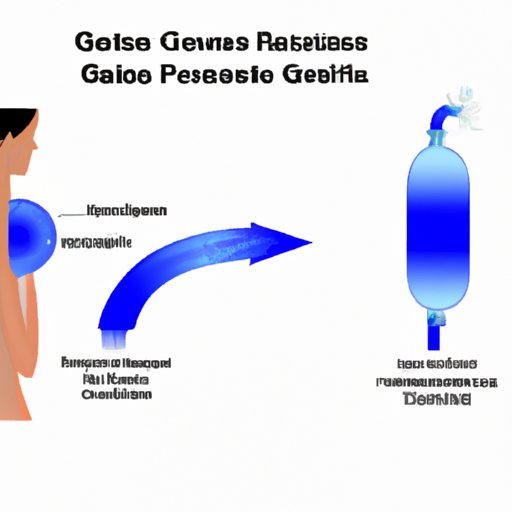Introduction
Gassiness can be uncomfortable and embarrassing. It’s a common problem that affects many people, but it doesn’t have to be something you live with. There are several steps you can take to reduce the amount of gas in your digestive system and find relief from bloating and discomfort.
Before exploring ways to stop being so gassy, let’s first define what gassiness is. Gassiness is the presence of excess gas in the digestive tract. This gas is made up of oxygen, nitrogen, carbon dioxide, hydrogen, and methane. The most common symptoms of gassiness are bloating, abdominal pain, flatulence, burping, and belching.
There are many reasons why someone may be gassy. Eating certain types of food, drinking carbonated beverages, an imbalance of bacteria in the intestines, and not chewing food properly can all contribute to excess gas production.
Avoid Foods That Cause Gas and Bloating
The first step in reducing gassiness is to avoid foods that cause gas and bloating. Certain foods are more likely to cause gas than others, so it’s important to be aware of which ones to limit or avoid.
High-Fiber Foods
High-fiber foods such as whole grains, fruits, vegetables, and legumes are important for maintaining a healthy digestive system. However, they can also increase gas production. Try eating smaller amounts of these foods and gradually increasing your intake over time.
Cruciferous Vegetables
Cruciferous vegetables such as broccoli, cauliflower, Brussels sprouts, and cabbage contain a type of carbohydrate called raffinose. This type of carbohydrate is not easily digested, so it ferments in the gut and produces gas. Try steaming or boiling these vegetables to make them easier to digest.
Beans and Legumes
Beans and legumes contain oligosaccharides, which are complex carbohydrates that are difficult to break down. As a result, these foods can produce a lot of gas. To reduce their gassiness, try soaking them overnight before cooking them.
Dairy Products
Dairy products such as milk, cheese, and yogurt contain lactose, which is a type of sugar that some people have difficulty digesting. If you’re lactose intolerant, you may experience increased gassiness after consuming dairy products. Try using lactose-free alternatives or taking a lactase supplement before eating dairy.
Artificial Sweeteners
Artificial sweeteners such as sorbitol and mannitol can cause gas and bloating. These sweeteners are often found in sugar-free gum, candy, and other low-calorie foods. Avoiding these foods can help reduce gassiness.

Increase Your Fiber Intake Gradually
High-fiber foods are important for maintaining a healthy digestive system, but if you’re not used to eating these foods, it can be difficult to adjust. Eating too much fiber at once can lead to increased gas and bloating. To avoid this, start off slowly by adding small amounts of fiber to your diet and gradually increasing your intake over time.
Start Slowly
If you’re new to high-fiber foods, start off by adding small amounts to your diet. Begin with one or two servings per day and gradually increase your intake over the course of several weeks or months.
Increase Intake Over Time
Once you’ve adjusted to the higher fiber intake, you can begin to increase your intake even further. Aim for 25-35 grams of fiber per day, depending on your age and gender. Be sure to drink plenty of water when increasing your fiber intake to help keep your digestive system running smoothly.
Drink Plenty of Water
Staying hydrated is key to reducing gassiness. Drinking plenty of water helps move food through your digestive system and prevents it from fermenting, which can lead to increased gas production. Aim for 8-10 glasses of water per day.
Benefits of Hydration
Not only does drinking water reduce gassiness, but it also helps flush toxins out of your body and keeps your cells healthy. Staying hydrated can also improve your energy levels and focus.
Tips to Increase Water Consumption
If you don’t like the taste of plain water, try adding fresh fruit or herbs such as mint or basil to give it some flavor. You can also set reminders throughout the day to remind yourself to drink water. And if you’re feeling especially thirsty, try drinking a glass of lukewarm water with a squeeze of lemon.
Exercise Regularly
Exercising regularly can also help reduce gassiness. Exercise increases blood flow to your digestive organs, which helps move food through your system more quickly. Aim for 30 minutes of moderate exercise per day.
Benefits of Exercise
In addition to helping reduce gassiness, exercise has many other benefits. It helps boost your mood, improves your sleep quality, and strengthens your immune system. Exercise can also help you maintain a healthy weight.
Types of Exercise
Any type of physical activity counts as exercise, so find something that you enjoy and stick with it. Examples include walking, jogging, swimming, cycling, dancing, and yoga. You can also do strength training exercises such as squats and push-ups.
Try Over-the-Counter Remedies
If you’re still experiencing gassiness after making dietary and lifestyle changes, there are several over-the-counter remedies that can help. Charcoal tablets, probiotics, and enzymes can all provide relief from gas and bloating.
Charcoal Tablets
Activated charcoal tablets are made from charcoal that has been treated to increase its absorptive properties. They work by binding to gases in the digestive system and preventing them from being released into the bloodstream. Take one tablet three times per day before meals.
Probiotics
Probiotics are beneficial bacteria that live in your digestive system. They help balance the bacteria in your gut, which can reduce gas and bloating. Look for a probiotic supplement with multiple strains of live bacteria, and take one capsule daily.
Enzymes
Digestive enzymes can also help reduce gassiness. These enzymes help break down food in the stomach and small intestine, which can make it easier for your body to absorb nutrients and reduce gas production. Take one capsule before each meal.
Conclusion
Gassiness can be uncomfortable and embarrassing, but it doesn’t have to be something you live with. By avoiding certain foods, increasing your fiber intake gradually, drinking plenty of water, exercising regularly, and trying over-the-counter remedies, you can find relief from gas and bloating.
To recap, here are the tips for reducing gassiness: Avoid high-fiber foods, cruciferous vegetables, beans and legumes, dairy products, and artificial sweeteners. Increase your fiber intake gradually. Drink 8-10 glasses of water per day. Exercise for 30 minutes per day. Try charcoal tablets, probiotics, and enzymes.
With these tips, you can find relief from gassiness and get back to living your life comfortably and confidently.
(Note: Is this article not meeting your expectations? Do you have knowledge or insights to share? Unlock new opportunities and expand your reach by joining our authors team. Click Registration to join us and share your expertise with our readers.)
